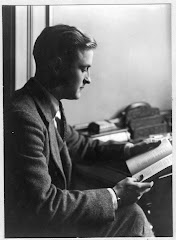On page 172, Nick says, "...it grew upon me that I was responsible, because no one else was interested..." He is speaking in reference to the responsibility that he feels arranging a gathering for Gatsby's funeral, but in the big picture, is Nick some how responsible for the outcome of this plot? He agreed to arrange the initial meeting between Daisy and Gatsby, fully aware of Gatsby's intentions. Maybe he agreed to Gatsby's plan because Nick had a serious distaste for Tom. Speaking of Nick's character, he notes that he is the only honest person he knows. How much of this text can we take at face value? Has the outcome affected how he presents himself to the reader? At one point he says that he never fully trusted Gatsby, but by the end, he says, "...I began to have a feeling of defiance, of scornful solidarity between Gatsby and me against them all" (p. 173). When Gatsby's father asks how Nick knew "Jimmy," Nick replies that they were very best friends. Were they?
Is Nick as trustworthy as he seems or is honesty supposed to separate him from Gatsby, Daisy, Tom, Jordan, and Myrtle who have all seemed to be corrupted by the east? I don't know if that can be answered because the only text we have is through his perspective, but it is just something to think about.
~Nicole
Subscribe to:
Post Comments (Atom)


4 comments:
Honesty is interesting to look at in this novel. Honesty does not seem to determine which characters are sympathetic and which are not in this novel in quite the same way that it does in others. Nick is able to admire Gatsby despite his knowledge of the man's illegal dealings and bootlegging. Ironically, it is the corrupt Daisy who takes pause at Gatsby's sordid past. Her indignation at his "dishonesty," however, is less moral than class-based. Her sense of why Gatsby should not behave in an immoral manner is based on what she expects from members of her milieu, rather than what she believes to be intrinsically right. The standards for honesty and morality seem to be dependent on class and gender in this novel. Tom finds his wife's infidelity intolerable, however, he does not hesitate to lie to her about his own affair.
Regarding Daisy's reaction to the discovery that Gatsby is involved in illegal dealings as his source of wealth:
From Nick's retelling of Gatsby's past, Gatsby took on the persona of an upperclass man when he met Daisy. At first, it seems as though Daisy and her surroundings seemed merely a symbol of status Jay hoped to achive, but he became infatuated with Daisy the more he tried to induct himself into her world. It even says that Gatsby was shocked to realize he loved her. I agree with you that Daisy was not so much appallled by Gatsby's current source of wealth, but instead, she was shocked to realize that the man she had loved for that one month five years ago wasn't even who she thought he was. Daisy had waited for Gastby when he was first away at war, thinking that if he returned that he would provide her with the lavish life she was accustomed to, but if he had in fact come back before the wedding, Daisy would have realized that there was no landed past in James Gatz's lineage. Just imagine how differently this story would have played out had Gatsby arrived before the wedding...
In regard to reading into Nick’s character, he is truly the only uncorrupted person in the novel. I don’t feel that his honesty is supposed to separate him from the corrupted “East Eggers.” With that said, I think F. Scott Fitzgerald intended for Nick to be a dynamic, influential piece in this great novel. Perhaps to a certain extent, the other characters envy him, as he seems to live a life without incident. When I think of Nick, the saying, “the meek shall inherit the earth,” comes to mind. While the East Eggers are living in the lap of luxury, they are doing so recklessly. As a reader, one gets the feeling that things could spiral out of control at any moment, but Nick is “the calm before the storm” in the lives of Daisy, Jordan, and of course, Jay Gatsby.
I think that it looking st the reliability of Nick as a narrator would be a good way to read against the text. We are only given Nick's perspective, and maybe he does have some reasons to protect himself. Gatsby creates an illusion with all of his spending. Is Nick creating a similar illusion of himself to for the reader. People like to point out the faults of others, and in doing so, sometimes forget to think about mistakes they have made, or how they would act in a similar situation. We could discuss the reliability of information when it comes from a biased source, and how much of the information we can take as true.
Post a Comment